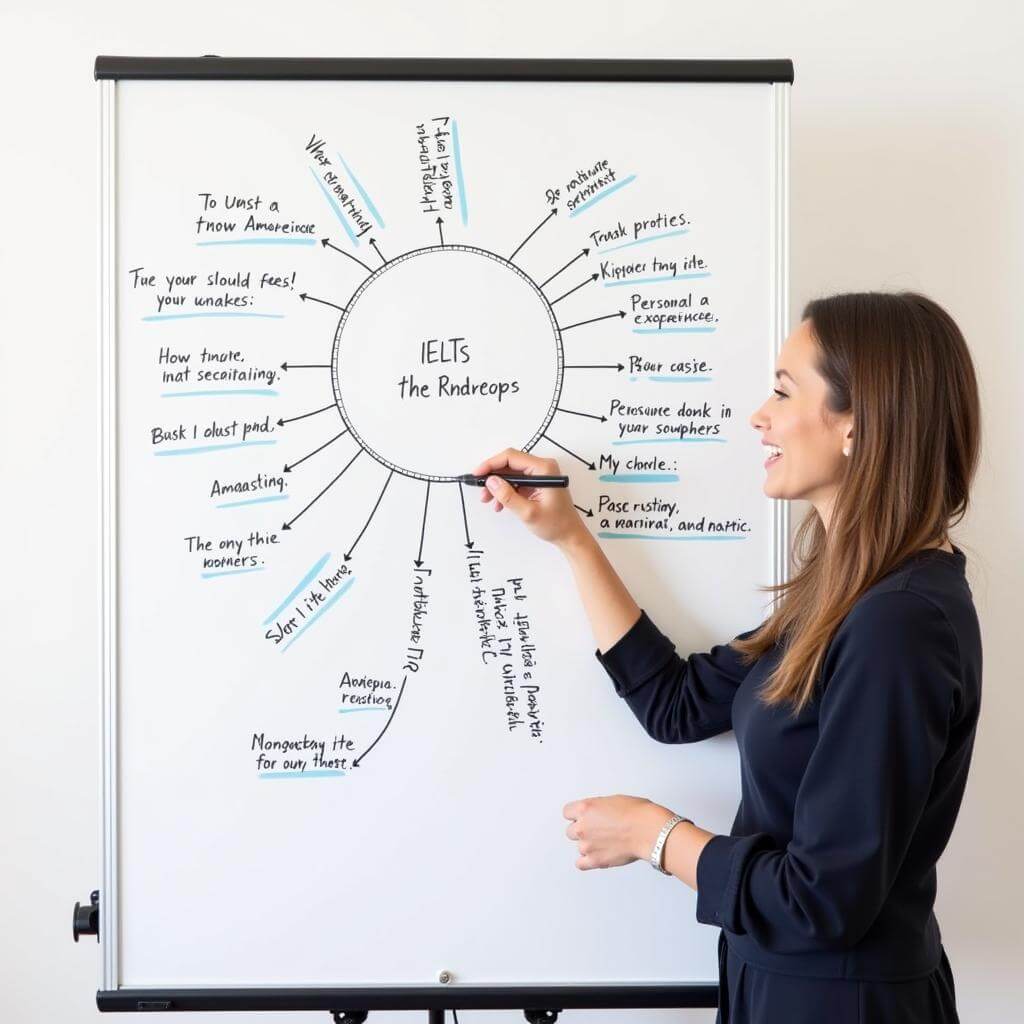IELTS Speaking Part 2 can be challenging for many test-takers. This article will provide you with expert strategies on how to answer IELTS Speaking Part 2 questions confidently and effectively. By following these tips, you’ll be well-prepared to tackle this crucial section of the IELTS Speaking test.
Understanding IELTS Speaking Part 2
IELTS Speaking Part 2, also known as the “long turn,” requires candidates to speak for 1-2 minutes on a given topic. You’ll receive a task card with a subject and specific points to address. Understanding the structure and expectations of this part is crucial for success.
Key Components of IELTS Speaking Part 2
- Task card: Contains the topic and prompts
- 1-minute preparation time
- 1-2 minutes of uninterrupted speaking
- Short follow-up questions from the examiner
IELTS speaking tips for non-native speakers can be particularly helpful for those who may feel less confident in their English speaking abilities.
Effective Strategies for Answering IELTS Speaking Part 2 Questions
1. Make the Most of Your Preparation Time
When you receive your task card, use the 1-minute preparation time wisely:
- Quickly read the entire card
- Identify key words in the prompts
- Jot down relevant ideas and vocabulary
- Organize your thoughts in a logical sequence
“The key to success in IELTS Speaking Part 2 is effective time management during preparation,” says Dr. Emma Thompson, IELTS expert with 15 years of experience.
2. Structure Your Answer
A well-structured answer is crucial for clarity and coherence:
- Introduction: Briefly introduce the topic
- Main points: Address each prompt on the task card
- Conclusion: Summarize or give a final thought
Improving focus on key paragraphs can help you maintain a clear structure throughout your response.
3. Develop Your Ideas
To speak for the full 2 minutes, you need to expand on your ideas:
- Provide specific examples
- Share personal experiences
- Explain reasons or consequences
- Compare and contrast ideas

4. Use a Range of Vocabulary and Grammar
Demonstrate your language proficiency by:
- Using topic-specific vocabulary
- Incorporating idiomatic expressions
- Varying your sentence structures
- Using a mix of tenses appropriate to the topic
Using grammar for clear communication is essential for expressing your ideas effectively.
5. Practice Time Management
Ensure you cover all points within the time limit:
- Allocate roughly 30 seconds to each main point
- Use transitional phrases to move between ideas smoothly
- Keep an eye on the examiner for time cues
6. Maintain Fluency and Pronunciation
Speak clearly and confidently:
- Pace yourself – not too fast, not too slow
- Use natural intonation and stress patterns
- Practice pronunciation of difficult words beforehand
How to develop fluency for IELTS speaking without pauses offers valuable tips for improving your speaking flow.
7. Handle Difficult Topics
Sometimes you may encounter unfamiliar or challenging topics:
- Stay calm and think creatively
- Draw from related experiences or knowledge
- Use general examples if you lack specific ones
- Focus on the aspects you can comfortably discuss
“When faced with a challenging topic, remember that the examiner is more interested in your language skills than your expertise on the subject,” advises Sarah Chen, IELTS preparation coach.
Handling tricky topics in part 3 provides strategies that can also be applied to Part 2 challenges.
Common Mistakes to Avoid in IELTS Speaking Part 2
- Memorizing scripts: This can sound unnatural and limit your ability to adapt.
- Speaking too fast: This may lead to pronunciation errors and reduced clarity.
- Focusing solely on one prompt: Ensure you address all points on the task card.
- Using overly complex language: Aim for clarity and accuracy over complexity.
- Going off-topic: Stay relevant to the task card prompts.
Practice Techniques for IELTS Speaking Part 2
To improve your performance in IELTS Speaking Part 2:
- Record yourself: Analyze your speeches for areas of improvement.
- Time yourself: Practice speaking for exactly 2 minutes.
- Use sample task cards: Familiarize yourself with various topics.
- Get feedback: Ask a teacher or study partner to evaluate your responses.
- Shadow native speakers: Listen to and imitate natural English speech patterns.
Conclusion
Mastering how to answer IELTS Speaking Part 2 questions requires practice, preparation, and the right strategies. By structuring your answers effectively, managing your time, and focusing on clear communication, you can excel in this part of the test. Remember to stay calm, speak naturally, and showcase your English language skills confidently.
FAQs
-
How long should I speak in IELTS Speaking Part 2?
You should aim to speak for the full 2 minutes. The examiner will stop you if you exceed this time. -
What if I can’t think of anything to say about the topic?
Try to relate the topic to your personal experiences or general knowledge. It’s okay to be creative as long as you stay relevant to the prompts. -
Should I write full sentences during the preparation time?
No, it’s better to jot down key words or short phrases to help you remember your main points. -
Is it okay to ask the examiner to explain a word on the task card?
It’s best to avoid this. Try to use the context to understand unfamiliar words or focus on the parts you do understand. -
How important is eye contact during IELTS Speaking Part 2?
Maintaining natural eye contact is important as it shows confidence and engagement. However, it’s okay to look away occasionally as you would in a normal conversation. -
Can I ask for extra time to prepare my answer?
No, the preparation time is strictly limited to 1 minute. Practice managing this time effectively before the test. -
What should I do if I finish speaking before 2 minutes?
Try to elaborate on your points or add a conclusion. It’s important to practice speaking for the full time to avoid finishing too early in the actual test.